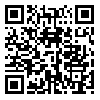Volume 46, Issue 4 (12-2022)
Research in Medicine 2022, 46(4): 132-140 |
Back to browse issues page
Download citation:
BibTeX | RIS | EndNote | Medlars | ProCite | Reference Manager | RefWorks
Send citation to:



BibTeX | RIS | EndNote | Medlars | ProCite | Reference Manager | RefWorks
Send citation to:
Safarzadeh A, Roshan R, Ahmadvand Z, Shafiei F, Bozorg B. The Effect of Stress Management Training on Students' Self- Esteem. Research in Medicine 2022; 46 (4) :132-140
URL: http://pejouhesh.sbmu.ac.ir/article-1-3144-en.html
URL: http://pejouhesh.sbmu.ac.ir/article-1-3144-en.html
Yas Educational Complex of Taleghani Hospital, Shahid Beheshti University of Medical Sciences, Tehran, Iran. , Atiye.safarzadeh@gmail.com
Abstract: (2335 Views)
Background and Aim: People with social phobia have lower self- esteem than normal people. A common treatment and intervention for this problem is stress management based on the cognitive- behavioral approach. For this purpose, in the present study, we aimed to determine the effectiveness of cognitive- behavioral stress management training on the self-esteem of students struggling social phobia.
Methods: The present study is an experimental design with a pretest-posttest and control group. 32 students with social phobia were selected with the highest score in the social phobia inventory (SPIN) through available sampling. After homogenization, the research sample was divided into experimental and control groups, and using the social phobia inventory (SPIN) and self- esteem rating scale (SERS) were assessed before and after the intervention. The experimental group underwent cognitive- behavioral stress management training for ten weekly sessions and the control group was waiting. The obtained results were analyzed using descriptive statistics and U Mann Whitney by SPSS software.
Results: In current study, 16 people were in the experimental group and 16 people in the control group (all members were female). None of the students left the intervention. U Mann Whitney showed that by controlling the differences between the two groups before the study, there was a significant difference between the final score of the experimental group compared to the control group. Cognitive- behavioral stress management training increased overall self- esteem from 17.05 ± 84.62 to 24.13 ± 243.68 (P < 0.001) and decreased social phobia from 6.99 ± 53.56 to 2.4 ± 47.5 (P < 0.001) in the experimental group.
Conclusion: It seems that the cognitive- behavioral stress management method can be used as an effective skill in treating students' social phobias.
Methods: The present study is an experimental design with a pretest-posttest and control group. 32 students with social phobia were selected with the highest score in the social phobia inventory (SPIN) through available sampling. After homogenization, the research sample was divided into experimental and control groups, and using the social phobia inventory (SPIN) and self- esteem rating scale (SERS) were assessed before and after the intervention. The experimental group underwent cognitive- behavioral stress management training for ten weekly sessions and the control group was waiting. The obtained results were analyzed using descriptive statistics and U Mann Whitney by SPSS software.
Results: In current study, 16 people were in the experimental group and 16 people in the control group (all members were female). None of the students left the intervention. U Mann Whitney showed that by controlling the differences between the two groups before the study, there was a significant difference between the final score of the experimental group compared to the control group. Cognitive- behavioral stress management training increased overall self- esteem from 17.05 ± 84.62 to 24.13 ± 243.68 (P < 0.001) and decreased social phobia from 6.99 ± 53.56 to 2.4 ± 47.5 (P < 0.001) in the experimental group.
Conclusion: It seems that the cognitive- behavioral stress management method can be used as an effective skill in treating students' social phobias.
Type of Study: Original |
Subject:
Pcycology
Received: 2022/01/16 | Accepted: 2022/05/31 | Published: 2023/02/15
Received: 2022/01/16 | Accepted: 2022/05/31 | Published: 2023/02/15
Send email to the article author
| Rights and permissions | |
 |
This work is licensed under a Creative Commons Attribution-NonCommercial 4.0 International License. |







